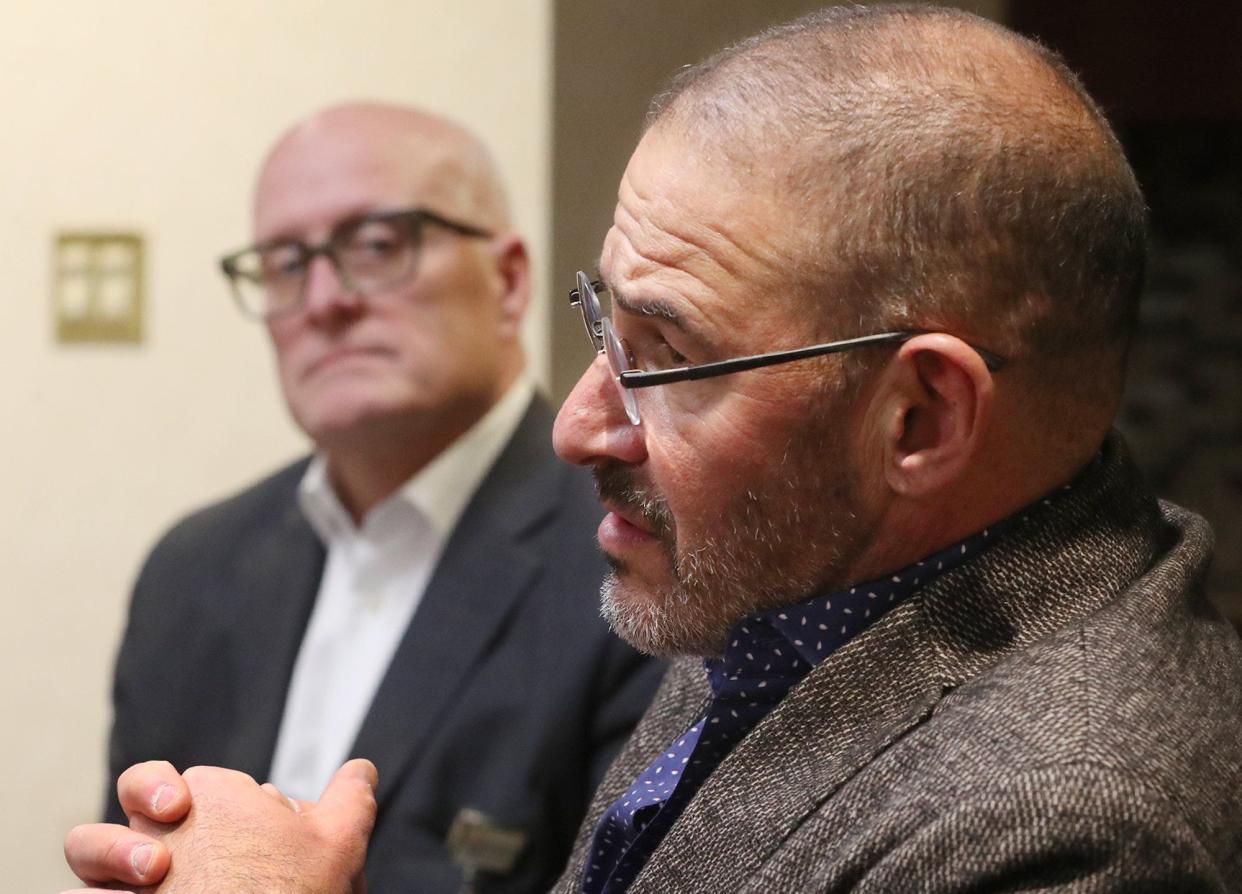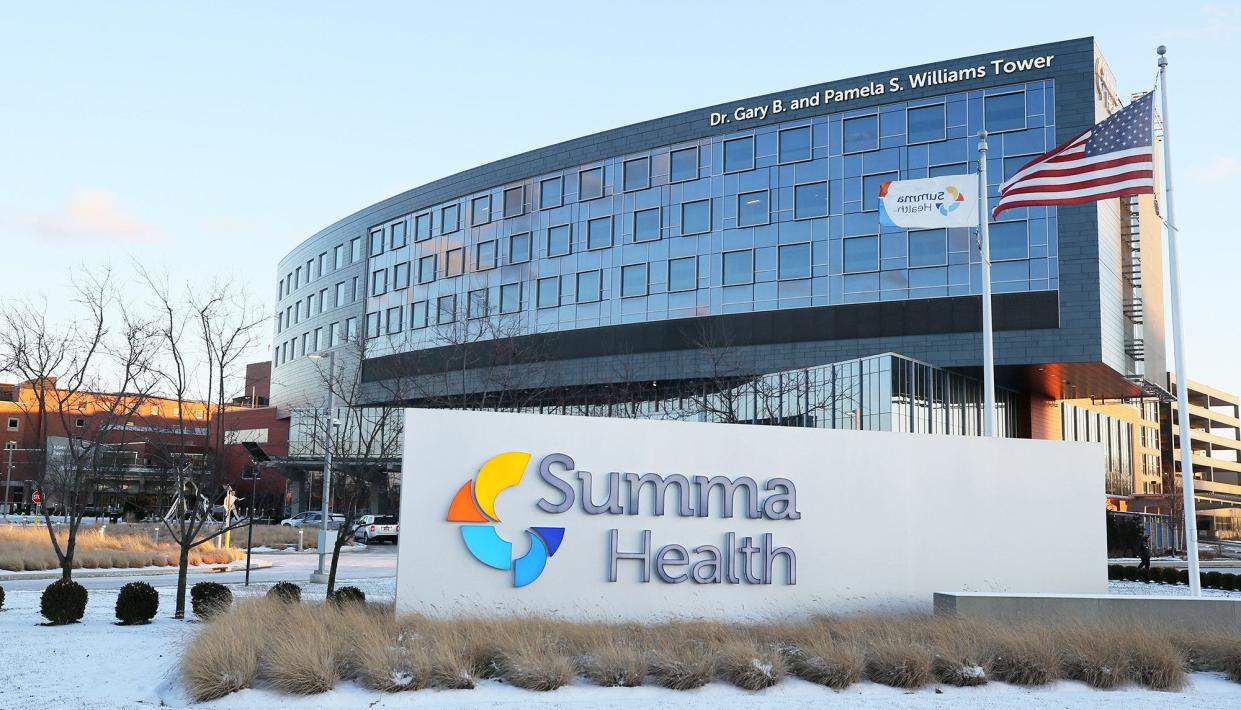HATCo, a new health care venture capital firm, to acquire Summa Health in Akron

Summa Health is trying something radical to secure its long-term future serving Greater Akron.
Summit County’s largest employer and hospital system has agreed to become a guinea pig of sorts for a new venture capital company aimed at transforming health care through technology.
Summa and Health Assurance Transformation Corporation (HATCo) today announced signing a non-binding letter of intent outlining HATCo’s planned acquisition of Summa.
The deal, which could be wrapped up by mid-summer, would maintain or grow Summa’s staffing and also cement its headquarters in Akron, neither of which was part of any other proposed Summa mergers or sales, said Dr. Cliff Deveny, Summa’s president and CEO.
Summa, which includes Akron City Hospital, the Barberton campus, SummaCare insurance company and outpatient locations and physician offices across the region, has more than 8,000 employees.
If the sale goes through, Summa would become a for-profit hospital, shedding its non-profit status.
Proceeds from the sale would go into a substantial community endowment. Deveny wouldn’t speculate how much money might be involved, but said it would be comparable to the GAR Foundation, which awards more than $7 million annually to Greater Akron nonprofits.
Summa sale: Here's what we know about the potential sale to venture capital firm HATCo
The Summa endowment would focus on everything that goes into good health, from housing and transportation to nutrition and addiction treatment, said George Strickler, chairman of Summa’s board of directors, who supports the deal with HATCo.
In exchange, HATCo would own a health system that it hopes will ultimately serve as a model for health care transformation across the industry, both in the U.S. and abroad.
Summa’s name and leadership team would also remain in place after the sale, along with the safety net of services Summa provides to the community, from behavioral healthcare to emergency room treatment.
Summa is among hospital groups across the country merging or selling themselves to larger companies to survive in a changing and competitive health care marketplace in recent years.
“Those models may improve things temporarily or take things apart…but we’re trying to expand our reach” through partnering with HATCo, Deveny said.
Who is HATCo?
HATCo is a new company owned by General Catalyst, one of the largest venture capital firms in the U.S. In recent years, it’s raised hundreds of millions of dollars to focus on health care.
Dr. Marc Harrison, a former Cleveland Clinic executive and pediatric emergency care physician, joined General Catalyst to launch and lead HATCo in October.
At the time, Harrison co-authored a blog post outlining HATCo’s three goals: Working on transformation at about 20 health systems HATCo partners with but does not own; Building a model of technology solutions to drive the transformation; And acquiring and operating a health system “for the long term where we can demonstrate the blueprint of this transformation for the rest of the industry.”
Summa, it turns out, was the health care system HATCo had in mind, Harrison said this week, joking that Summa and HatCo were merely “dating” at the time.
Now, he and Deveny said it’s serious.
Harrison – who also served as CEO of Cleveland Clinic Abu Dhabi before becoming president and CEO of Utah-based Intermountain Healthcare – said he met Deveny about a year ago through mutual friends and they’ve been talking about the purchase ever since.
Deveny said the most compelling part about HATCo is they believe in a health care model that takes care of everyone, including through charity care.
What a shift from non-profit to for-profit care may mean for people who depend on Summa is not entirely clear.
A 2021 study by Ohio University professors Cory Cronin and Berkeley Franz found that for-profit hospitals, like the one proposed by HATCo, were more likely than nonprofits like Summa to be in communities with greater economic and health needs.
These communities had lower rates of health insurance, more unemployment and poorer health outcomes.
For-profit hospitals are not obligated to report their community benefits like their non-profit peers, however. That, the professors said in 2021, means there is not much research to show whether they act as anchors improving the health of communities around them.
HATCo founder calls Summa a 'spectacular asset'

Harrison said Summa is a “spectacular asset, not just clinically” but “philosophically.”
He praised Summa for finding a long-term solution to its needs before reaching a crisis, which has driven other hospital systems into mergers or sales.
Summa has been looking to sell itself or fina a new partner for several years.
Most recently, a deal to sell Summa to Michigan-based Beaumont Health, another non-profit, fell through in 2020.
That deal would have created a nonprofit organization with $6.1 billion in annual revenue with 45,000 employees and more than 6,000 affiliated physicians.
During the pandemic, both Summa and Beaumont paused moving forward and Beaumont later backed out, even though regulators had already approved the purchase.
Summa was trending toward an operating loss in 2023, posting a $7 million loss for the first nine months, financial records show.
Summa's cash on hand, meanwhile, was trending down between 2022 to 2023, but was still within what industry experts consider the adequate range of having enough money to pay at least 100 to 150 days worth of bills.
Deveny said Summa’s credit rating remains stable and its health insurance plan, SummaCare, is rated 4.5 out of 5, making it among one of Ohio’s best.
Akron Mayor Shammas Malik said in a statement the city looks forward to working with HATCo "on the future of health care in Akron."
"My hope and belief is today's announcement will ensure Akron families can continue to rely on Summa for excellent care for decades to come," he said.
Harrison said Summa has a “growth mindset,” saying it’s already done hard work to, serve more people on an outpatient basis and is changing operationally to yield more efficiency
On top of that, Harrison said Summa has a strong executive team that provides good ideas and good management. That includes a long-term strategy Summa started working on about five years ago, but has yet to fully implement because it hasn’t had enough money.
HATCo, Harrison said, will make that investment. How much money HATCo would infuse into Summa is not clear.
“To have an organization that is forward-looking is an extraordinary treasure,” Harrison said.
It’s not a short-term fix, however.
What changes will the sale mean for Summa?
Deveny said there will be some change within the first year of a purchase. But HATCo doesn’t anticipate a full transformation at Summa for at least five years.
“HATCo aims to create a new standard of healthcare investing and set expectations for investors to think longer term,” Harrison wrote in the blog post introducing the company.
“We believe it’s not about taking costs out as much as it is about putting technology and innovation in,” he wrote, adding that part of HATCo’s plan involves health systems like Summa capitalizing on new revenue streams.
One way Summa might make more money is by serving more people.
Summa now turns away about 18% of people who call to book appointments or services because it doesn’t have the staffing or equipment to serve them, said Ben Sutton, Summa’s chief operating officer.
It’s a common problem for hospital systems, Deveny and Harison said.
“There are not enough doctors, not enough MRI machines in town,” Deveny said. At Summa, some patients either have to wait a significant amount of time for an appointment or go elsewhere, he said, noting that some patients have been forced to go to Youngstown to get an imaging scan.
Evolving and new technology investments could also help with patient care, Deveny said.
A few years ago, Summa launched something called the Complex Care Institute for patients with three medical conditions who also use a medical device, like a ventilator.
An interdisciplinary team of each patients’ specialists meet in person or online to continually update the patient’s care plan. In the first year, patients in the program spent 150 to 200 days a year in the hospital.
After a year with all of their doctors working together, these patients spent only five to seven days hospitalized in a year.
Imagine, Deveny said, how patient care might improve if Summa could expand that concept to patients with chronic illnesses, like congestive heart failure
Doctors, meanwhile, often spend one to two hours each working day on paperwork. Technology could eliminate that.
Nurses, Deveny said, have “300% more data points brought to them every day than 10 years ago. They have to absorb and how do we put this together and come up with a plan.” Technology could ease that burden, sorting through that data and revealing what’s most important.
On-line appointments during COVID combined with a demographic shift to people increasingly comfortable with technology is also changing medicine, Deveny and Harrison said.
People will always twist an ankle or need an emergency room, but there’s no reason to make many patients drive to a large hospital campus and pay for parking.
““People are much more tech savvy and comfortable” online,” Harrison said, saying hospital systems need both “clicks and mortar.”
Additionally, Deveny said there’s a whole industry of remote health care devices that can send information to health care providers. Someone with heart failure, for example, could pick up a voucher from their insurance plan and pick up a blue-tooth-enabled blood pressure monitor that would provide records to the person’s doctors.
'It's not the same old same old'
Summa leaders, Harrison said, will continue to lead the company because they understand what Greater Akron needs.
Harrison said HATCo and Summa are a solid match.
“Here’s this great health system that had a vision for the future,” and HATCo looking for a partner with a like-minded future, Harrison said.
Akron, he said, is a community that appears to be on the edge of a renaissance.
And, if Summa’s deal with HATCo goes through, Harrison said, “it’s not the same old same old” in health care.
This article originally appeared on Akron Beacon Journal: Summa Health in Akron to be acquired by HATCo, a venture capital firm
